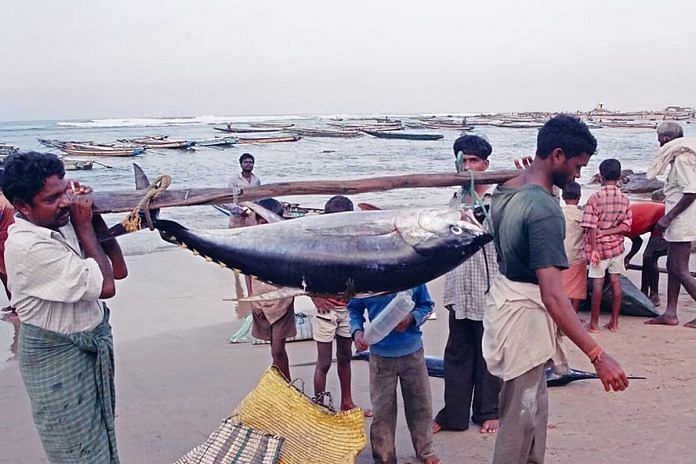New Delhi: Last month, environment minister Bhupender Yadav said the “blue economy” — the use of the ocean’s resources for economic growth — would be among the areas of focus during India’s G20 presidency.
Discussions on the matter are already underway. The Environment and Climate Sustainability Working Group (ECSWG), during its first meeting in Bengaluru between 9 and 11 February, discussed ways to curb marine litter, how to design principles based on a “sustainable and climate-resilient blue economy”, and the protection and enhancement of biodiversity.
The Supreme Audit Institution (SAI) Engagement Group of G20 countries (SAI20), chaired by the Comptroller Auditor General of India (CAG), has also taken up blue economy as an area of interest, with the objective of assessing the benefits accrued from blue economy and the conservation of marine economy.
According to the SAI20, auditors “can scale up their audits, especially SAIs of those nations who have close proximity to the oceans and seas, develop study papers on the condition of the blue economy, and make recommendations on how governments could direct their efforts and policies for the development of the blue economy of their nations”.
Discussions on harnessing a blue economy are occurring at a time when the oceans are seeing unprecedented levels of warming owing to rising global temperatures and the effects of climate change, which are causing environmental degradation and threatening livelihoods.
ThePrint explains why the blue economy is being talked about, the challenges involved and India’s blue economy policy.
Also read: How climate change affects economic growth
‘The next frontier’
Blue economy is considered the “next great economic frontier”, but has no universally accepted definition.
The World Bank defines “blue economy” as “sustainable use of ocean resources for economic growth, improved livelihoods and jobs, while preserving the health of the ocean ecosystem”.
Seafood harvesting (fishing and aquaculture), extraction and use of marine non-living resources (such as minerals and oil and gas), generation of renewable energy (such as offshore wind), and commerce and trade are examples of activities that could count towards a blue economy.
Recently, in a presentation organised by the CAG on 27 February, Tapas Paul, lead environmental specialist at the World Bank, said that the total value of ocean assets (natural resources) globally was $24 trillion.
Developing a blue economy is also linked to the 14th Sustainable Development Goal (SDG, laid down by the UN and calling for action to promote prosperity while protecting the planet) about “life below water”, which involves the conservation and sustainable use of the oceans, seas and marine resources for development.
Some policymakers argue that in order to achieve SDG 14, shaping a blue economy policy is necessary.
Among the 17 UN SDGs, the 14th has also got the least amount of long-term funding, according to a white paper by the World Economic Forum. It found that while $175 billion per year is needed to achieve SDG 14 by 2030, just below $10 billion was actually invested between 2015 and 2019.
Challenges
Harnessing the benefits of the blue economy is not without challenges.
According to a document by the UN and World Bank, one challenge pertains to current economic trends, which are rapidly degrading ocean resources through “unsustainable extraction of marine resources, physical alterations and destruction of marine and coastal habitats and landscapes, climate change, and marine pollution”.
There is also a need to “invest in the human capital required to harness the employment and development benefits of investing in innovative blue economy sectors”.
Many have criticised the concept of a blue economy as favouring the exploitation of ocean resources for economic growth, which runs contrary to conservation objectives.
An editorial on blue economy in the journal Sustainability Science said: “The lack of a common definition can be particularly problematic not only because of its incoherence, but also since it remains open for manipulation by different actors depending on their interests.”
International research and advocacy firm Transnational Institute noted that “tragically, small-scale fisher people are, in most cases, the only actors that can truly be said to be using these ocean-spaces in a sustainable manner”, adding that the blue economy discourse “seems to be less about really challenging what is driving the destruction of marine and coastal ecosystems, namely the many different ocean industries, and more about turning conservation into a profitable venture, while accommodating destructive uses of ocean-space”.
India’s blue economy policy
India has a 7,517 km coastline, making discussions around a blue economy particularly relevant.
Central government thinktank NITI Aayog has coined its own definition of “blue economy” for the Indian context, which would include “the entire system of ocean resources and manmade economic infrastructure in marine, maritime and onshore coastal zones within India’s legal jurisdiction, which aid in the production of goods and services and have clear linkages with economic growth and environmental sustainability and national security”.
The Centre is also in the midst of designing a domestic “blue economy policy” emphasising the sustainable development of the nation’s coastal areas.
India’s position as G20 president is also an opportunity to advocate for the global south, where many ocean-dependent communities are vulnerable, according to Nilanjan Ghosh and Srinath Sridharan of Observer Research Foundation, who wrote in an article published in January that it “brings about the unique opportunity to prioritise the blue economy for the purpose for growth, green economy and social equity”.
(Edited by Nida Fatima Siddiqui)
Also read: ‘Extract and earn’ model for oceans is finished. Blue economy is a historic opportunity



